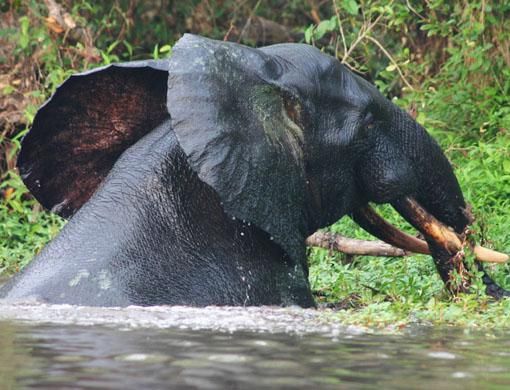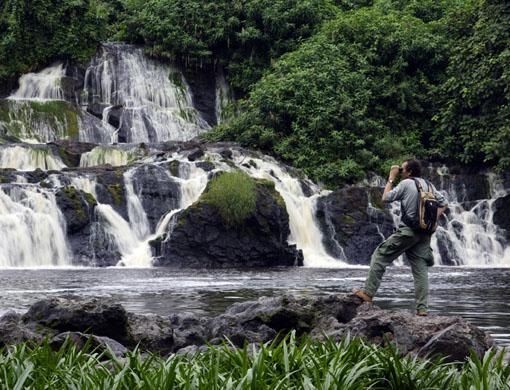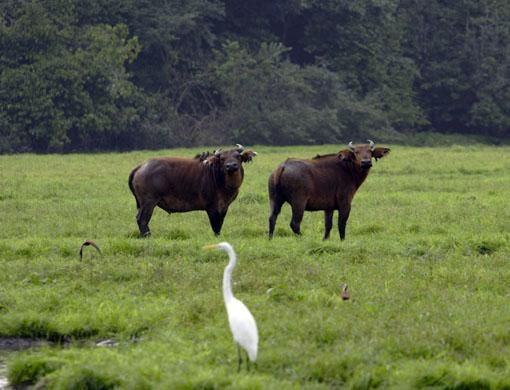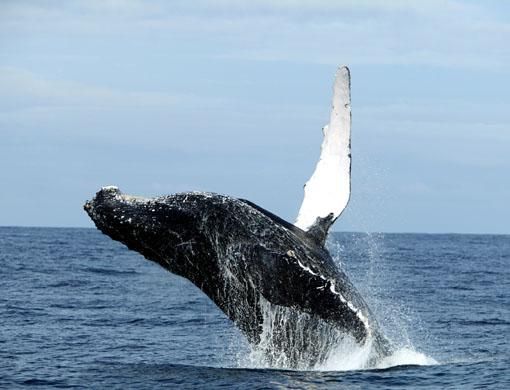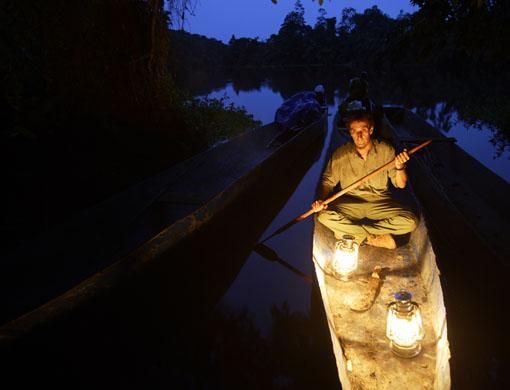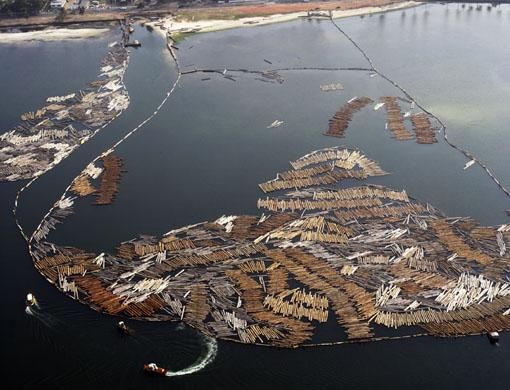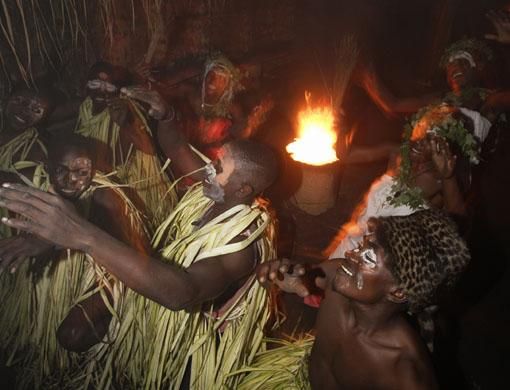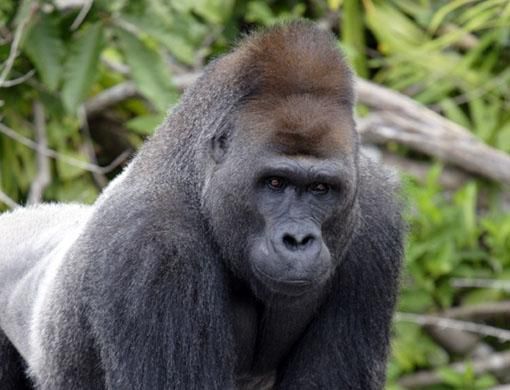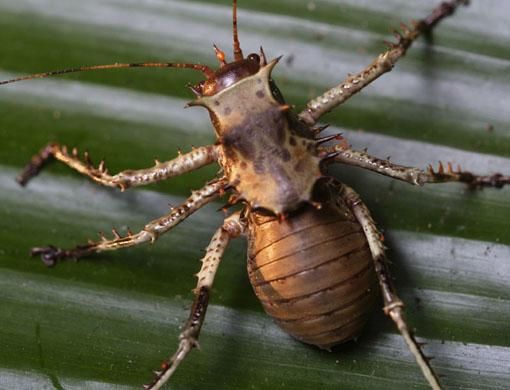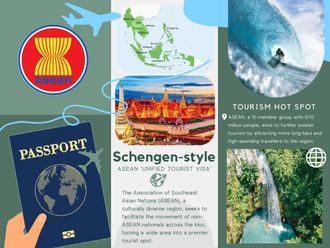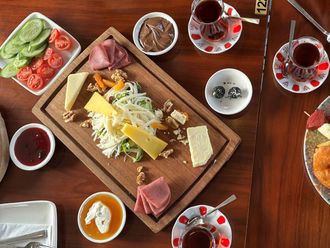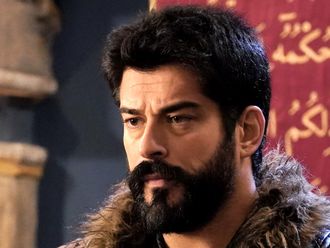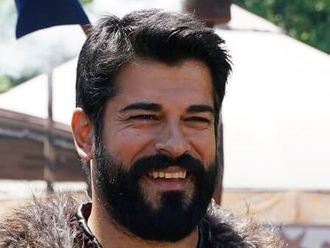Gliding over the brown waters of the Ivindo, with the oil lamp illuminating the stern, it seemed as if I was travelling suspended in a dark green hyperspace, which encircled our dugout canoe made from okume wood.
Firmin, the captain, watched through the gloom, searching for floating logs and sandbanks. The sounds of the forest were all around as the sky disappeared to the inky-black distance.
Men in boats
We travelled another five miles downstream until we could hear the distant rumble of the Kongou Falls: a crescendo of decibels that played like a heavy shower drumming on the corrugated iron roofs of a shantytown.
Our camp was just beyond the last of the little rapids that preceded the great cascade.
We had left early that morning from the market in Makokou, a city with few redeeming attractions in the northeast of Gabon. We had bought supplies — vegetables, fresh fruit, packets of freeze-dried soup — and picked up a crew in Loaloa, a village that earns a living from selling sand collected from the riverbed.
We had to cross a dozen rapids, precariously balanced in these handmade dugout canoes. It wasn't dangerous — just that the river was almost dry. And there was no other way to cover the 40 kilometres that separated Makokou from the falls and our camp.
But the pirogues were long and thin, and constructed almost without a keel to enable them to navigate the shallow waters of the dry season.
There was little water and at some points we were stranded on the gravel of the riverbed. Our belongings were stacked in the stern as a balance — and to keep them from getting wet. We could have gone on foot through the tannin-coloured, watery-and-vegetation-filled darkness. We paddled instead.
A little later, we gathered around a fire, where spicy fish soup bubbled in a pot.
The rumble of the cascades was soporific.
We couldn't even gaze at the stars for distraction: clouds thick as snowdrifts remained firmly in place beyond the fringe of branches obscuring the sky. There was nothing else to do except bundle up in our sleeping bags.
Deep in the forest
When we awoke, it was barely possible to comprehend that time had moved on. The sun never reaches the forest floor. It reflects off the branches and leaves to create a diffused and soft light.
We went sleepily down to the foot of the cascades and looked up at the sky — another heavily overcast day.
Gustavo — a co-founder of Trust The Forest — some villagers and I bathed, while Firmin and his skilful crew threw nets into the frothy pools.
They made us lunch and we did our laundry as we talked about how to save the rainforest from the big logging companies.
The trees were the real reason we were here.
Gabon has two basic resources: wood and oil. Following independence from France and the arrival of mining and logging companies, the economy grew.
But the flood of currency also had a detrimental impact on the country's work ethics. The hardest and most labour-intensive jobs are done by migrant workers, mainly from Cameroon, Congo-Brazzaville and Equatorial Guinea.
In 2002, President Omar Bongo Ondimba declared that Gabon would change the system of logging permits — cutting quotas — and create 13 national parks. The timber companies were moved out of protected areas.
More than 11 per cent of the country, almost 30,000 square kilometres of rainforest, was declared a zone of global interest. In collaboration with the Wildlife Conservation Society (WCS) and other environmentalist groups, the borders of the newly protected areas were set.
But even today there are no governmental park guards and there is little control of the protected lands. The logging companies are encroaching within the park boundaries. But there are some foundations and associations — such as WCS, Trust the Forest and World Wildlife Foundation — that protect the land and conduct research. They employ local staff, creating ties and trust with the people there.
Stationary safari
After Kongou Falls, Gustavo and I moved to the Langoué Bai, in Ivindo Park. We were a short distance from the WCS researchers, who kept an eye on the bais, or glades, which are home to elephants, antelope, buffalo and gorillas.
We experienced a stationary safari for the first time. For several days, we remained perched on a wooden tower, watching animals pass by 10 metres below us.
Then we returned to Libreville to rest our aching limbs before heading south.
The first lagoons along the Atlantic coast begin south of Port Gentil: a collection and transportation hub for the timber industry.
We landed in Omboue, a village surrounded by savannah. Tour guides from Operation Loango (www.africas-eden.com), were waiting to take us to Petit Evengue, an islet with wooden chalets, a gorilla sanctuary and some wonderful southern African hospitality.
Next morning, blessed with a little sun, we moved on to Iguela Lodge, located on Rembo Lagoon. We boarded a two-level aluminium barge and sailed at five knots on Engowe Channel for the rest of the afternoon.
The riverbanks were covered with green papyrus, glades of savannah and watering holes. We saw elephants, buffalo, crocodiles, wild pigs, pelicans, crane, kingfishers, hornbills and other animals that spend this part of the year living between the flat marshlands and the forest, near the sea.
We returned at twilight to find Akaka Camp lit by torches and candles. An oil lamp was set out on the veranda as the scent of herbal baths, resin and water lilies filled the air.
The shadows of the isombe, padduk, kossipò, mekambo and wenge trees stood out against the night sky. The camp was like an oasis encircled by the rest of Africa and the chirping forest. The ocean was less than a stone's throw away.
And we slept as soundly as the elephants.
— Davide Scagliola is an Italy-based freelance writer
Go there... Libreville ... From the UAE .. From Dubai
Ethiopian Airlines flies three days a week via Addis Ababa. Fare from Dh4,405
Air France flies three days a week via Paris. Fare from Dh4,895
— Information courtesy: The Holiday Lounge by Dnata.
Ph: 04 4380454


